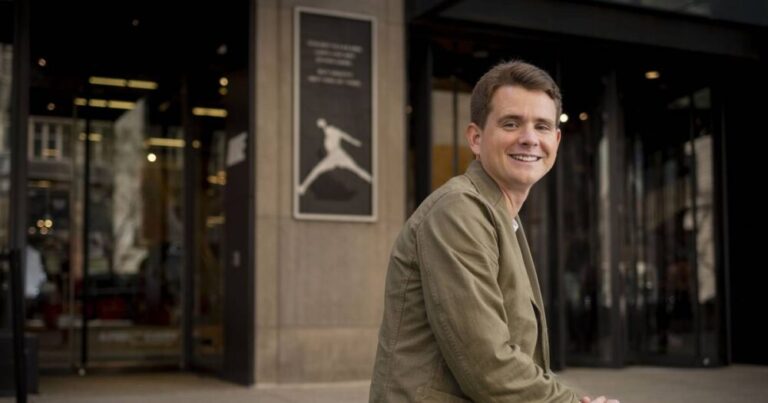Notice: Trying to get property 'post_title' of non-object in /home/ofzfvenynm4q/public_html/wp-content/plugins/wp-rss-feed-to-post/includes/wprss-ftp-display.php on line 109
Many famous hands collaborated on director Ben Affleck’s “Air,” now in theaters. “Argo” style, with shoes instead of hostages, it sells a rousing, semi-fictionalized version of events surrounding the invention of Nike’s Air Jordan shoe line; the gumption of Nike marketing executive Sonny Vaccaro (portrayed by Matt Damon), among others, in securing Michael Jordan for an unprecedented sponsorship deal; and the backstory of how a “film nerd” (his phrase) from Chicago’s western suburbs grew up to be Alex Convery.
Until “Air,” Convery was part of Los Angeles’ great ocean of unproduced screenwriters, though he’d come a lot closer than most. In his 20s, he had two of his scripts on the coveted Black List, an annual shortlist of unproduced screenplays. Last year, Convery made Variety’s “10 Screenwriters to Watch.” By then, “Air” had happened. The writer found a champion through Mandalay Pictures head Peter Guber, one of the forces behind ESPN’s “The Last Dance.” Then Affleck and Damon got interested. Suddenly (or finally) Convery went from unproduced to produced, by way of Affleck and Damon’s production company Artists Equity.
Not that the “Air” script sailed through unchanged. Convery’s version underwent an Affleck rewrite and, at Jordan’s request — in “Air” we see the superstar only in long shot, usually just off-camera, or in archival footage — several characters were beefed up (his mother, Deloris Jordan, for example; Jordan encouraged the casting of Viola Davis). Others who weren’t in it originally ended up with a piece of the narrative. Chris Tucker came on board as Nike exec Howard White; Marlon Wayans joined the ensemble as George Raveling, the player turned coach and, as Jordan said in 2015, the guy who actually pushed Jordan into considering Nike over Converse or Adidas for a shoe deal. Convery retains sole screenwriting credit for “Air,” thanks to Affleck’s impulse to help a talented newcomer.
Convery and his wife, a Veterans Affairs pharmacist, live in Venice Beach, California. “I have the most unstable job in existence,” he told me the other day. “So between us, we land somewhere in the middle.”
Convery and I met for coffee around the corner from the Nike store downtown. The following has been edited for length and clarity.
Q: Your family moved from Naperville to Western Springs, and went to Lyons Township High School, is that right?
A: That’s right. Born out east, then moved to the western suburbs. I did the summer screenwriting program at (the University of Southern California) between my junior and senior year of high school. It’s not like I had any ties to Hollywood. It was never presented as a career opportunity. But I grew up loving movies. I’d go to the movies every Friday, whatever it was. I miss those days, when you’d go without pretense or even taste. Just to see whatever.
Q: At that age, you’re just trying to figure out what “taste” is, or what’s yours.
A: Exactly. At 15, 16, I was getting into serious movies, Criterion Collection stuff, starting to learn about directors and their filmographies. I started with the Coen brothers and Paul Thomas Anderson. This was 2007, so you’re talking about “No Country for Old Men,” “There Will Be Blood,” “Michael Clayton,” “Zodiac.” For Christmas that year my dad got me a book on the Coen brothers, the collected screenplays: “Blood Simple,” “Raising Arizona,” “Miller’s Crossing,” “Barton Fink.” First time I’d ever seen a screenplay. Black cover, with Nicolas Cage on it. It was one of those lightning bolt moments. And I thought, OK, this is what I want to do.
My parents were supportive and freaked out at the same time, but I applied to filmmaking summer programs at DePaul, Iowa, all over the country, and ended up in this screenwriting 101 class at USC. I was 17 and felt like I’d found my people, my place, my purpose. It was everything I dreamed of without knowing I was dreaming of it. Senior year of high school was increasingly difficult, coming back from that experience. But you go through it. Then I headed back out to LA to USC, the (undergraduate) screenwriting program, which was great. They treated it very seriously, but at 18, what the hell are you going to write about? I graduated with big ambitions. But it’s not that easy.
Q: As you found out.
A: Yeah. I paid my dues in my 20s. Assistant jobs. Worked at a management firm. Worked for a producer. It was hard. Those are tough jobs. You just write on the side, trying to crack it. In 2018 I ended up writing this script “Bag Man,” kind of like “Heat” set in the world of college football. It’s a crime movie about the guy who pays recruits under the table and tries to manage all the craziness in his life and there’s an NCAA agent tasked with bringing him down. That script got me my agent, and my reps, and it was one of those moments where you feel, “Omigosh, I’ve made it!” But that script has come together and fallen apart a million times. I wrote another one, this biopic of Stan Lee and Jack Kirby and the origins of Marvel Comics. It’s a movie about their friendship, and how in some ways, business and capitalism are the water in the gears of creation. Those two created the foundation for the current industry moment, the one we’ve been in since “Iron Man” in 2008. There’s definitely a story there and the script almost happened. But didn’t. I thought: I can’t write another spec biopic where I don’t control the rights. It’s too hard.
But there I was, watching “The Last Dance,” and that segment about Air Jordans, and I thought: There’s a movie there. Somewhere.
Q: Let’s talk about that. I appreciate how you’ve talked elsewhere about the process that went down with “Air,” and the other contributors.
A: You send a spec script out in the world, and hope for the best. Getting Ben and Matt was, for me, obviously a kind of dream scenario. But a lot of times in Hollywood the dream scenario can turn into a nightmare very quickly. There’s a million examples of the young, unproduced screenwriter who disappears, with maybe a shared credit. They’re basically told, “OK, we’ll take it from here. See you at the premiere.” You get your one (Writers Guild of America)-mandated day on set. They shake your hand and give you a water bottle and the writer watches one take and then he’s outta there. I mean, I know there are reasons for that, and there’s already so many cooks in the kitchen.
But Ben and Matt were nothing if not transparent. They said, look, we have some ideas on the script and want to take a pass at it, add this and that, and take another look at the ending. So you make the bargain, happily, in order to get a movie made. It sounds like (expletive), but they were great. Ben was keyed into the idea of giving all the major characters their moment in the spotlight. The original script was even more Sonny-centric than the final version. To use the easiest metaphor in the world: It’s like a basketball team. Ben was the point guard, setting up each of the other players.
Q: I went to the movie with our 13-year-old, and he came out asking: How did they manage to make an interesting movie when everybody knew the ending?
A: You go back to the classic examples. You know the Titanic in “Titanic” is going to sink. “Apollo 13,” they’re going to make it back alive. “Argo,” you probably know how the hostage crisis will end. So let’s call that (foreknowledge) a disadvantage. But you try to turn that into an advantage. Given that the audience knows the ending, what fun can we have along the way to make you forget?
Q: Has your success reawakened interest in the earlier scripts you mentioned?
A: Yes and no. There’s reasons those movies didn’t happen. So much of why a movie gets made is right time, right place, right people reading the right script. With the Stan Lee/Jack Kirby script, there are, not surprisingly, rights issues with Marvel and with showing the characters, and how much you can get away with. But we’re getting more reads on those scripts now, yes. And they’re characters I really love. The Stan Lee/Jack Kirby story is too good a story not to happen. That movie will happen eventually. Will it be my script? Probably not. You never know.
I was a Marvel kid growing up, but in a million years I never imagined we’d be on the third “Guardians of the Galaxy” movie. It’s unfathomable, in a way, for better and for worse.
Q: Back to “Air.” It’s already enough of a hit to take some heat. I liked it, didn’t love it; many think it’s the best movie of 2023 so far. I want to talk about a really intriguing review on NPR by Aisha Harris, which takes the film to task for being “nothing more than a craven exercise in capitalist exaltation” and “a two-hour ad for Nike and the uber-rich.”
A: I have not read it. It’s been sent to me a couple of times.
Q: It’s harsh. And worth reading. In essence, she’s asking: Why root for these people?
A: Look, I understand that viewpoint. I sat down with this script to begin with, thinking this can’t be a commercial for Nike. There’s a reason Nike didn’t participate in the making of this movie. I wanted to take some risks and talk about some things they maybe wouldn’t be entirely comfortable with. Including the Jordan family as a central element was always of the utmost importance, for that exact reason. Sure, it’s easy to celebrate the Nike side of the story. But by the third act of the movie, you’re almost rooting against Nike in a way, where Viola Davis really dominates (the narrative) and Deloris stands firm on asking for the percentage of the sales. To me, it’s a movie that examines where we are today in terms of athlete’s compensation. I guess I look at it this way: This is what happened. Now, you could not make a movie about it. Or you can show it as it was.
I get the criticism, and some people are going to reject “Air” on its premise. That’s OK. That’s the beauty of criticism. Everyone’s welcome to their opinion.
There’s a reason the movie isn’t about (Nike founder) Phil Knight as a protagonist. There’s a reason it isn’t about (Michael Jordan’s agent) David Falk. Sonny was a contract employee with Nike who had a vision. I don’t want to be hyperbolic about it, but that vision changed the world. To me, that’s a human story worth telling.
“Air” is now playing in theaters.
Michael Phillips is a Tribune critic.
Twitter @phillipstribune





